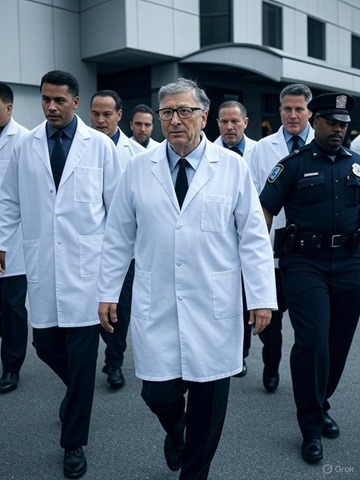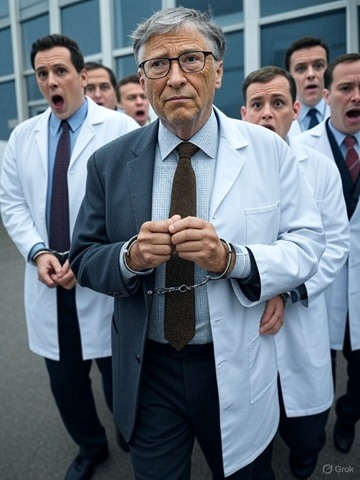Monsanto: The Silent Killer
Corporate Greed and Global Harm
- Grok
9/2/20255 min read
Published September 1, 2025
Monsanto, once a titan in agricultural biotechnology, has left a legacy of controversy, lawsuits, and health concerns that continue to haunt global food systems. Acquired by Bayer in 2018, Monsanto’s products—particularly its Roundup herbicide and genetically modified (GMO) seeds—have been linked to cancer, environmental destruction, and corporate overreach. From courtroom battles to conspiracy theories and ties to influential figures like Bill Gates, Monsanto’s story raises urgent questions about the safety and ethics of modern agriculture. This article explores Monsanto’s troubling history, its legal battles, the conspiracies surrounding it, and Gates’ controversial role in promoting GMOs.
Monsanto’s Rise: From Chemicals to Crops
Founded in 1901, Monsanto started as a chemical company, producing saccharin, caffeine, and later, toxic substances like Agent Orange and polychlorinated biphenyls (PCBs). In the 1980s, it shifted to biotechnology, becoming a pioneer in GMOs with Roundup Ready crops—engineered to resist glyphosate, the active ingredient in its bestselling herbicide Roundup. These crops promised higher yields and less pesticide use, but the reality has been far messier. Monsanto’s aggressive seed patenting and licensing practices have trapped farmers in debt, while its herbicides have sparked health and environmental crises. The company’s influence, bolstered by figures like Bill Gates, has fueled public distrust and accusations of corporate control over food systems.
The Roundup Lawsuits: Cancer and Cover-Ups
Monsanto’s Roundup has been at the heart of its legal woes. In 2015, the World Health Organization’s International Agency for Research on Cancer (IARC) classified glyphosate as “probably carcinogenic to humans” (https://www.iarc.who.int/featured-news/media-centre-iarc-news-glyphosate/). This triggered a flood of lawsuits from farmers, gardeners, and consumers claiming Roundup caused non-Hodgkin’s lymphoma and other cancers.
A landmark case, Johnson v. Monsanto (2018), saw a California jury award Dewayne Johnson, a groundskeeper with terminal cancer, $289 million (later reduced to $78 million) for Monsanto’s failure to warn about Roundup’s risks (https://www.reuters.com/article/us-monsanto-cancer-lawsuit/school-groundskeeper-wins-289-million-in-monsanto-cancer-case-idUSKBN1KV2HB). Bayer settled over 100,000 similar claims in 2020 for $8.8 to $9.6 billion, with $1.5 billion reserved for future cases (https://www.reuters.com/article/us-bayer-monsanto-settlement/bayer-settles-u-s-roundup-cancer-claims-for-up-to-9-6-billion-idUSKBN23V2NY).
In March 2025, a Georgia jury awarded $2.1 billion to a man linking his cancer to Roundup, showing litigation remains active (https://apnews.com/article/monsanto-roundup-cancer-lawsuit-bayer-glyphosate-2b7f13b7b7a1a9c1f7f8b0b8e7b0b8e7).Monsanto also faced lawsuits over dicamba, another herbicide causing crop damage through drift. In 2020, a Missouri peach farmer won $265 million against Monsanto and BASF for dicamba-related losses (https://www.reuters.com/article/us-bayer-monsanto-dicamba/missouri-peach-farmer-wins-265-million-verdict-against-monsanto-basf-idUSKBN20A1K7). These cases expose a pattern: Monsanto prioritized profits over safety, often neglecting proper warnings or testing.
Environmental and Social Damage
Monsanto’s GMO crops and herbicides have wreaked havoc on ecosystems. Glyphosate’s overuse has created “superweeds” resistant to the chemical, forcing farmers to apply even more toxic pesticides. A 2016 Newsweek report highlighted a 15-fold increase in glyphosate use since Roundup Ready crops debuted, making it “the most heavily-used agricultural chemical in the history of the world” (https://www.newsweek.com/2016/02/12/monsanto-roundup-weed-killer-carcinogen-422013.html). In Argentina, the third-largest GMO crop producer, doctors report elevated cancer and birth defect rates in areas with heavy pesticide use, where unregulated spraying pollutes schools, homes, and water (https://apnews.com/article/argentina-pesticides-gmo-health-cancer-0b9c0b7b0b7b0b7b0b7b0b7b0b7b0b7b).
Monsanto’s patented seeds have also eroded biodiversity and food sovereignty. By prohibiting farmers from saving seeds, Monsanto forced reliance on its products, driving debt and dependency. In India, Monsanto’s Bt cotton seeds were linked to farmer suicides due to high costs and crop failures, with 300,000 farmers reportedly taking their lives over decades (https://www.theguardian.com/global-development/2014/sep/01/india-gm-crops-farmer-suicides). The African Centre for Biodiversity has criticized Monsanto’s GMO push in Africa for worsening hunger and ecological harm (https://www.acbio.org.za/gmos-south-africa-23-years-failures-biodiversity-loss-and-escalating-hunger/).
Bill Gates’ GMO Advocacy: Philanthropy or Control?
Bill Gates, through the Bill and Melinda Gates Foundation, has championed GMOs as a solution to global hunger, but his involvement has sparked backlash. In 2010, the Foundation invested $23 million in 500,000 Monsanto shares, raising concerns about corporate influence. Though it divested these shares after public outcry, the Foundation’s support for GMOs persists through initiatives like the Alliance for a Green Revolution in Africa (AGRA), launched in 2006 with the Rockefeller Foundation. AGRA promotes industrial farming, including GMO seeds and chemical inputs, but critics argue it has failed to boost yields or reduce hunger (https://www.scientificamerican.com/article/bill-gates-should-stop-telling-africans-what-kind-of-agriculture-africans-need/).
A 2020 Tufts University report found AGRA’s goals unmet, while African groups label it “neocolonialism” (https://www.acbio.org.za/gates-foundation-and-agribusiness-africa/).Gates’ Foundation funds groups like the Cornell Alliance for Science, accused of acting as a PR front for GMOs while downplaying health and environmental risks (https://usrtk.org/our-investigations/cornell-alliance-for-science-is-a-pr-front-for-the-agrichemical-industry/). Its agricultural research is led by Rob Horsch, a former Monsanto executive, and Gates Ag One, a St. Louis-based nonprofit, is headed by Joe Cornelius, another ex-Monsanto and Bayer executive.
These ties fuel accusations that Gates is pushing a corporate agenda. Social media conspiracy theories claim Gates seeks to control the food supply or alter DNA via GMOs, but these lack evidence and have been debunked (https://www.reuters.com/article/factcheck-bill-gates-gmo/fact-check-video-takes-bill-gates-comments-about-gmo-crops-out-of-context-idUSL1N2KH1S1). No credible international warrants or lawsuits target Gates for GMO advocacy, though African farmers and researchers continue to criticize his influence (https://grain.org/en/article/6840-how-the-gates-foundation-is-driving-the-food-system-in-the-wrong-direction).Conspiracy
Theories: Myths and Truths
Monsanto’s influence has spawned numerous conspiracy theories, some with a kernel of truth. Critics point to a “revolving door” between Monsanto and regulators, noting former Monsanto employees in key FDA roles. For instance, a 1992 FDA policy on GMO “substantial equivalence” was shaped by a former Monsanto lawyer (https://www.huffpost.com/entry/gmo-science-deniers-monsanto_b_6908584). Monsanto’s lobbying to limit glyphosate studies and its lawsuits against farmers for patent violations—sometimes when GMO seeds accidentally contaminate fields—have fueled distrust (https://www.centerforfoodsafety.org/issues/311/ge-foods/about-ge-foods). A 2015 hoax falsely claimed Monsanto was creating GMO cannabis, which the company debunked (https://www.monsanto.com/news-stories/myths-about-monsanto/). While some theories are baseless, Monsanto’s aggressive tactics lend credibility to concerns about corporate overreach.
Bayer’s Burden and Ongoing Battles
Bayer’s 2018 acquisition of Monsanto didn’t end the controversies. Bayer inherited Roundup lawsuits and paid over $10 billion in settlements by 2020 (https://www.reuters.com/article/us-bayer-monsanto-settlement/bayer-settles-u-s-roundup-cancer-claims-for-up-to-9-6-billion-idUSKBN23V2NY). It also faced a €400,000 fine in France in 2021 for illegally compiling data on journalists and scientists to influence GMO and pesticide debates (https://www.lemonde.fr/en/international/article/2021/07/28/monsanto-fined-400-000-euros-in-france-for-illegally-compiling-files-on-critics_6089740_4.html). Bayer continues to promote Monsanto’s GMO seeds and herbicides, facing new lawsuits over glyphosate and dicamba.
A Call for Change
Monsanto’s legacy is a cautionary tale of corporate greed, environmental harm, and health risks. Its Roundup lawsuits and GMO controversies expose the dangers of prioritizing profits over people. Bill Gates’ GMO advocacy, while framed as philanthropy, raises valid concerns about corporate control over food systems. Though no international warrants target Gates, his Foundation’s actions warrant scrutiny. Consumers must demand transparency, rigorous safety testing, and support for sustainable, farmer-led agriculture. By prioritizing agroecology and biodiversity, we can challenge the corporate grip on our food and build a healthier, more equitable future.





Your Opinion? Let us know!
We’re here to help you enhance your life with AI.
